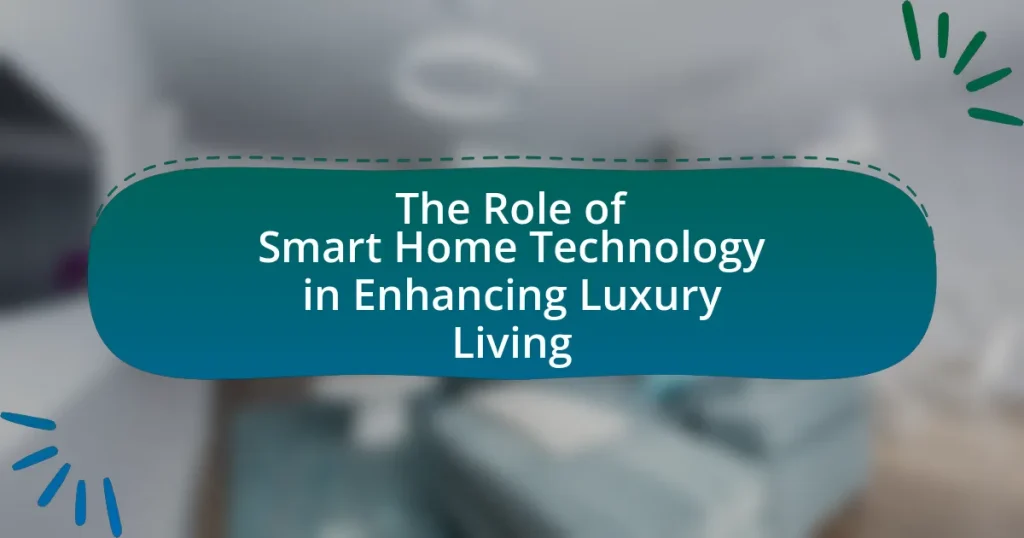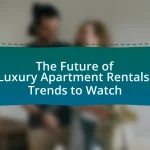Smart home technology is increasingly integral to luxury living, enhancing convenience, security, and energy efficiency for homeowners. This article explores how smart systems automate various aspects of the home, from lighting and climate control to advanced security measures, ultimately elevating the living experience. Key features appealing to luxury homeowners include personalized automation, real-time monitoring, and seamless integration with high-end appliances. Additionally, the article addresses the growing demand for smart home technology in the real estate market, its impact on property values, and the challenges associated with implementation, such as privacy concerns and compatibility issues. Future trends indicate a shift towards artificial intelligence and innovative security solutions, further shaping the landscape of luxury living.
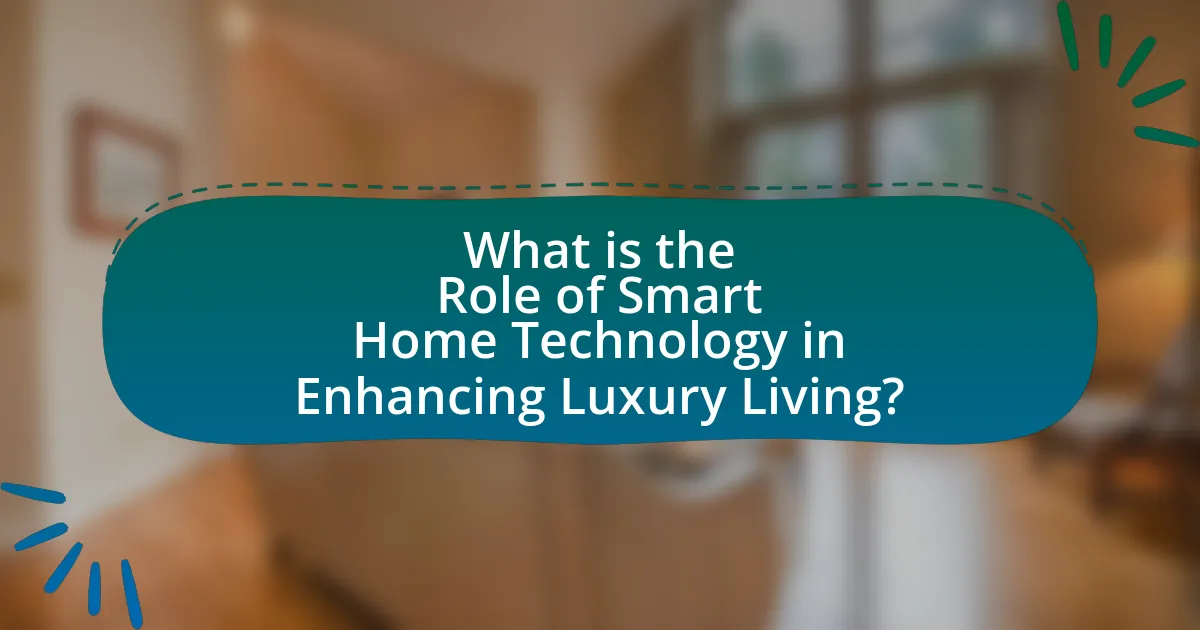
What is the Role of Smart Home Technology in Enhancing Luxury Living?
Smart home technology plays a crucial role in enhancing luxury living by providing convenience, security, and energy efficiency. These systems allow homeowners to control various aspects of their living environment, such as lighting, climate, and security, through centralized devices or mobile applications. For instance, a study by the Consumer Technology Association found that 70% of luxury homeowners prioritize smart home features for their ability to improve comfort and convenience. Additionally, smart home technology can integrate with high-end appliances and systems, offering personalized experiences that cater to individual preferences, further elevating the luxury living experience.
How does Smart Home Technology integrate into luxury living environments?
Smart Home Technology integrates into luxury living environments by providing seamless automation, enhanced security, and personalized experiences. High-end residences utilize smart systems to control lighting, climate, and entertainment through centralized interfaces, allowing for tailored living conditions that align with residents’ preferences. For instance, luxury homes often feature advanced security systems that include smart locks and surveillance cameras, which can be monitored remotely, ensuring safety and peace of mind. Additionally, the integration of voice-activated assistants and smart appliances enhances convenience, enabling residents to manage their homes effortlessly. According to a report by Statista, the global smart home market is projected to reach $174 billion by 2025, indicating a growing trend in luxury properties adopting these technologies to elevate living standards.
What are the key features of Smart Home Technology that appeal to luxury homeowners?
Key features of Smart Home Technology that appeal to luxury homeowners include advanced automation, enhanced security, energy efficiency, and seamless integration with high-end appliances. Advanced automation allows homeowners to control lighting, climate, and entertainment systems remotely, providing convenience and customization. Enhanced security features, such as smart locks and surveillance cameras, offer peace of mind through real-time monitoring and alerts. Energy efficiency is achieved through smart thermostats and energy management systems, which can reduce utility costs while maintaining comfort. Lastly, seamless integration with high-end appliances ensures that luxury homeowners can manage their entire home ecosystem effortlessly, enhancing the overall living experience.
How does Smart Home Technology improve convenience and comfort in luxury homes?
Smart Home Technology enhances convenience and comfort in luxury homes by automating daily tasks and providing seamless control over various systems. This technology allows homeowners to manage lighting, climate, security, and entertainment systems remotely or through voice commands, significantly reducing the effort required for routine activities. For instance, smart thermostats can learn user preferences and adjust temperatures automatically, leading to increased energy efficiency and personalized comfort. Additionally, integrated security systems offer real-time monitoring and alerts, ensuring peace of mind. According to a study by the Consumer Technology Association, 70% of smart home device owners report improved convenience in their daily lives, underscoring the effectiveness of these technologies in luxury settings.
Why is Smart Home Technology becoming essential in luxury living?
Smart Home Technology is becoming essential in luxury living due to its ability to enhance convenience, security, and energy efficiency. Luxury homeowners increasingly seek integrated systems that allow for seamless control of lighting, climate, and security through smart devices. For instance, a study by Statista indicates that the global smart home market is projected to reach $135.3 billion by 2025, reflecting a growing demand for these technologies among affluent consumers. Additionally, smart home features such as automated security systems and energy management not only provide peace of mind but also contribute to sustainability, aligning with the values of modern luxury living.
What trends are driving the adoption of Smart Home Technology in high-end residences?
The adoption of Smart Home Technology in high-end residences is primarily driven by increasing demand for convenience, enhanced security, and energy efficiency. High-income homeowners are increasingly seeking integrated systems that allow for remote control of home functions, such as lighting, climate, and security, through smartphones or voice-activated devices. According to a report by Statista, the global smart home market is projected to reach $174 billion by 2025, indicating a significant growth trend fueled by consumer interest in automation and connectivity. Additionally, luxury buyers are motivated by the desire for personalized experiences and the ability to monitor and manage their homes from anywhere, further accelerating the integration of smart technologies in upscale living environments.
How does Smart Home Technology enhance security in luxury living spaces?
Smart Home Technology enhances security in luxury living spaces by integrating advanced systems such as surveillance cameras, smart locks, and alarm systems that can be monitored and controlled remotely. These technologies provide real-time alerts and surveillance capabilities, allowing homeowners to respond immediately to potential threats. For instance, a study by the Electronic Security Association found that homes with security systems are 300% less likely to be burglarized compared to those without. Additionally, smart home devices can automate security protocols, such as locking doors at specific times or activating lights to simulate occupancy, further deterring intruders.
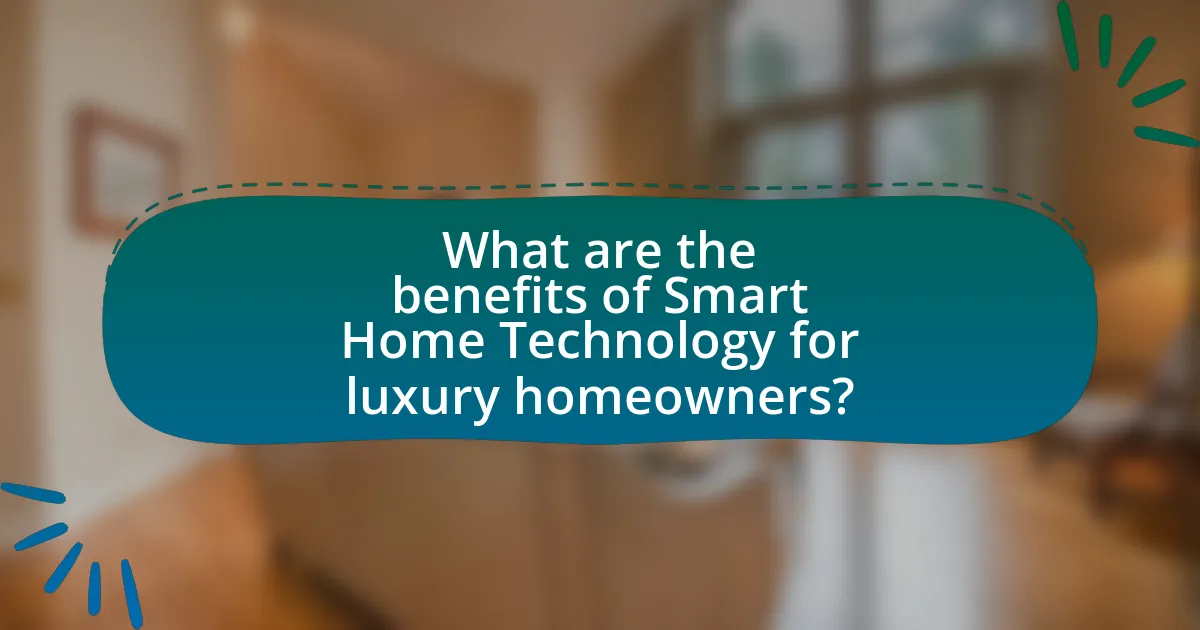
What are the benefits of Smart Home Technology for luxury homeowners?
Smart Home Technology offers luxury homeowners enhanced convenience, security, and energy efficiency. These systems allow homeowners to control various aspects of their home, such as lighting, climate, and security, from a single device or remotely, streamlining daily tasks. For instance, smart thermostats can optimize energy usage, potentially reducing energy bills by up to 10-15%, according to the U.S. Department of Energy. Additionally, advanced security features, including smart locks and surveillance cameras, provide real-time monitoring and alerts, significantly increasing home safety. Overall, Smart Home Technology not only elevates the living experience but also contributes to cost savings and peace of mind for luxury homeowners.
How does Smart Home Technology contribute to energy efficiency in luxury homes?
Smart Home Technology significantly enhances energy efficiency in luxury homes by automating and optimizing energy consumption. Systems such as smart thermostats, lighting controls, and energy monitoring devices allow homeowners to adjust settings remotely and create schedules that align with their lifestyle, reducing unnecessary energy use. For instance, smart thermostats can learn user preferences and adjust heating or cooling accordingly, leading to energy savings of up to 15% annually, as reported by the U.S. Department of Energy. Additionally, smart lighting systems can automatically turn off lights in unoccupied rooms, further minimizing energy waste. These technologies not only contribute to lower utility bills but also support sustainability efforts by reducing the overall carbon footprint of luxury residences.
What specific technologies help reduce energy consumption in luxury living?
Smart home technologies significantly reduce energy consumption in luxury living through automation and efficiency. Smart thermostats, such as the Nest Learning Thermostat, optimize heating and cooling by learning user preferences and adjusting settings accordingly, leading to energy savings of up to 15% annually. Energy-efficient lighting systems, like Philips Hue, allow for remote control and scheduling, reducing electricity usage by enabling users to turn off lights when not needed. Additionally, smart appliances, including Energy Star-rated refrigerators and washing machines, utilize advanced sensors to minimize energy consumption during operation. These technologies collectively contribute to a more sustainable luxury living environment while maintaining comfort and convenience.
How can luxury homeowners monitor and manage energy usage effectively?
Luxury homeowners can effectively monitor and manage energy usage by utilizing smart home technology, such as energy management systems and smart meters. These systems provide real-time data on energy consumption, allowing homeowners to identify patterns and optimize usage. For instance, smart thermostats can adjust heating and cooling based on occupancy and preferences, leading to significant energy savings. According to a study by the American Council for an Energy-Efficient Economy, homes equipped with smart technology can reduce energy consumption by up to 30%. Additionally, integrating renewable energy sources, like solar panels, with smart home systems enables homeowners to track energy production and consumption, further enhancing efficiency and sustainability.
What impact does Smart Home Technology have on property value?
Smart Home Technology positively impacts property value by increasing market appeal and perceived convenience. Properties equipped with smart home features, such as automated lighting, security systems, and energy management, often command higher prices. According to a 2021 survey by the National Association of Realtors, 57% of homebuyers consider smart home technology a valuable feature, leading to quicker sales and higher offers. Additionally, homes with smart technology can see a price increase of up to 5% compared to similar homes without such features, as reported by a study from the real estate platform Zillow.
How does the integration of Smart Home Technology influence real estate market trends?
The integration of Smart Home Technology significantly influences real estate market trends by increasing property values and attracting tech-savvy buyers. Properties equipped with smart technology, such as automated lighting, security systems, and energy management, often command higher prices, as evidenced by a 2021 study from the National Association of Realtors, which found that homes with smart features sold for an average of 5% more than comparable homes without such technology. Additionally, the demand for smart homes is rising, with 70% of homebuyers expressing a preference for properties that offer smart technology, indicating a shift in buyer expectations and preferences in the real estate market.
What are the potential returns on investment for luxury homeowners implementing Smart Home Technology?
Luxury homeowners implementing Smart Home Technology can expect potential returns on investment ranging from 5% to 30% in property value increase. This technology enhances energy efficiency, security, and convenience, making homes more attractive to buyers. According to a study by the National Association of Realtors, 70% of homebuyers are willing to pay more for a home with smart technology features, indicating a strong market demand. Additionally, smart home systems can lead to significant savings on energy bills, with estimates suggesting up to 30% savings on heating and cooling costs, further enhancing the overall financial return for homeowners.
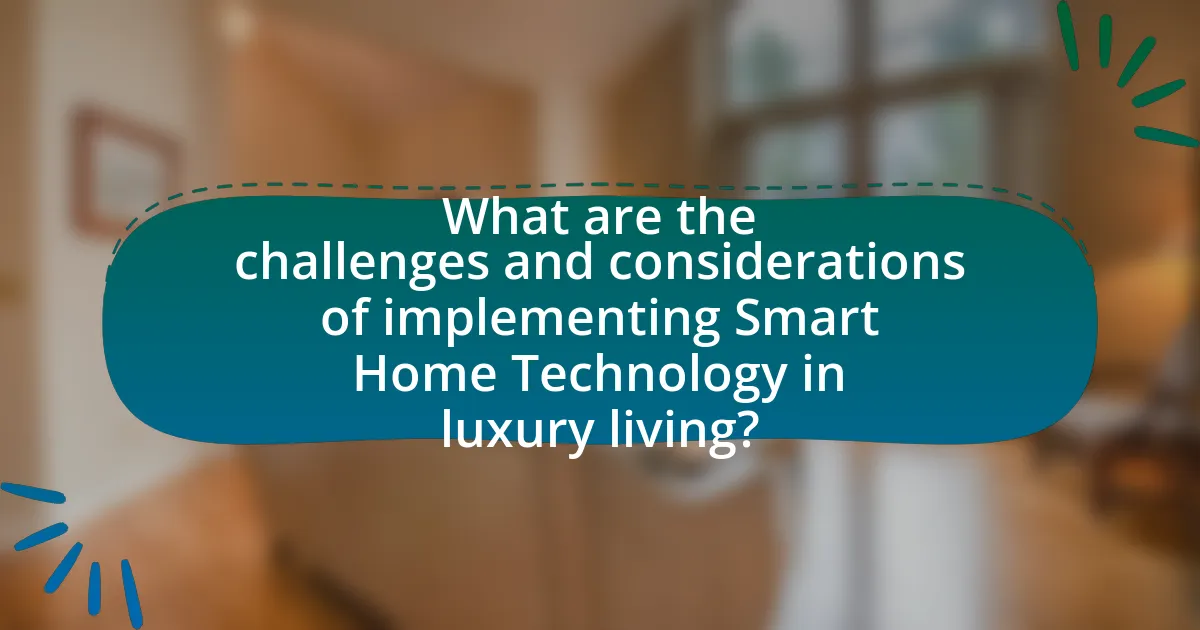
What are the challenges and considerations of implementing Smart Home Technology in luxury living?
Implementing Smart Home Technology in luxury living presents challenges such as high costs, integration complexities, and privacy concerns. The initial investment for advanced systems can be substantial, often exceeding tens of thousands of dollars, which may deter some homeowners. Additionally, integrating various smart devices from different manufacturers can lead to compatibility issues, complicating the user experience. Privacy concerns arise as these technologies often require data collection and internet connectivity, increasing the risk of unauthorized access or data breaches. According to a report by the Consumer Technology Association, 70% of consumers express concerns about data security in smart home devices, highlighting the importance of addressing these issues in luxury implementations.
What are the common concerns luxury homeowners have about Smart Home Technology?
Luxury homeowners commonly express concerns about the security and privacy of Smart Home Technology. They worry that connected devices may be vulnerable to hacking, potentially compromising personal data and home security systems. According to a 2021 survey by the Consumer Technology Association, 70% of homeowners cited security as a primary concern when adopting smart home devices. Additionally, luxury homeowners often question the reliability of these technologies, fearing that system failures could disrupt their daily lives. The complexity of integration with existing home systems also raises concerns, as homeowners seek seamless functionality without technical issues.
How can privacy and security issues be addressed in Smart Home Technology?
Privacy and security issues in Smart Home Technology can be addressed through robust encryption, regular software updates, and user education. Implementing end-to-end encryption protects data transmitted between devices, making it difficult for unauthorized users to access sensitive information. Regular software updates ensure that vulnerabilities are patched, reducing the risk of exploitation by cybercriminals. Additionally, educating users about secure practices, such as changing default passwords and recognizing phishing attempts, empowers them to take control of their home security. According to a 2021 report by the Cybersecurity & Infrastructure Security Agency, 85% of breaches involve human error, highlighting the importance of user awareness in enhancing security.
What are the potential compatibility issues with existing luxury home systems?
Potential compatibility issues with existing luxury home systems include integration challenges between different brands and technologies, outdated infrastructure, and varying communication protocols. Many luxury home systems utilize proprietary technologies that may not seamlessly connect with newer smart home devices, leading to functionality limitations. For instance, a study by the Consumer Technology Association found that 70% of homeowners experienced difficulties when trying to integrate devices from different manufacturers. Additionally, older wiring and network setups may not support the bandwidth required for advanced smart home features, further complicating compatibility.
How can luxury homeowners ensure a seamless Smart Home Technology experience?
Luxury homeowners can ensure a seamless Smart Home Technology experience by investing in a robust, integrated system that prioritizes compatibility and user-friendliness. Selecting devices that adhere to common standards, such as Z-Wave or Zigbee, facilitates communication between various smart devices, reducing connectivity issues. Additionally, employing a centralized control system, like a smart home hub, allows for streamlined management of all devices from a single interface, enhancing user experience. Research indicates that homes equipped with integrated smart technology can increase property value by up to 20%, demonstrating the financial benefits of a well-executed smart home setup.
What best practices should be followed when selecting Smart Home devices?
When selecting Smart Home devices, prioritize compatibility with existing systems to ensure seamless integration. Research indicates that devices from the same ecosystem, such as Google Home or Amazon Alexa, work more effectively together, enhancing user experience and functionality. Additionally, consider security features, as a study by the Cybersecurity & Infrastructure Security Agency highlights that vulnerabilities in smart devices can lead to breaches. Evaluate user reviews and expert ratings to gauge reliability and performance, as consumer feedback often reflects real-world usage. Lastly, assess the long-term support and updates provided by manufacturers, as ongoing software updates are crucial for maintaining device security and functionality over time.
How can homeowners maintain and troubleshoot their Smart Home systems effectively?
Homeowners can maintain and troubleshoot their Smart Home systems effectively by regularly updating software, ensuring strong network security, and conducting routine checks on devices. Regular software updates are crucial as they often include security patches and new features that enhance functionality. Strong network security, such as using complex passwords and enabling two-factor authentication, protects against unauthorized access. Routine checks, including testing device connectivity and functionality, help identify issues early. According to a study by the Consumer Technology Association, 70% of Smart Home device issues can be resolved through basic troubleshooting steps, emphasizing the importance of proactive maintenance.
What are the future trends of Smart Home Technology in luxury living?
The future trends of Smart Home Technology in luxury living include increased integration of artificial intelligence, enhanced energy efficiency, and advanced security systems. Artificial intelligence will enable homes to learn and adapt to residents’ preferences, optimizing comfort and convenience. Energy-efficient technologies, such as smart thermostats and automated lighting, will reduce consumption and lower utility costs, appealing to environmentally conscious luxury homeowners. Additionally, advanced security systems featuring biometric access and real-time monitoring will provide heightened safety and peace of mind. These trends reflect a growing demand for personalized, sustainable, and secure living environments in the luxury market.
How is artificial intelligence shaping the future of Smart Home Technology?
Artificial intelligence is significantly shaping the future of Smart Home Technology by enabling enhanced automation, personalized user experiences, and improved energy efficiency. AI algorithms analyze user behavior and preferences, allowing smart devices to adapt and respond intelligently to individual needs. For instance, smart thermostats can learn a homeowner’s schedule and adjust temperatures accordingly, leading to energy savings of up to 15% as reported by the U.S. Department of Energy. Furthermore, AI-powered voice assistants facilitate seamless control of various smart devices, creating a more integrated and luxurious living environment. This integration not only enhances convenience but also elevates the overall quality of life in luxury homes.
What innovations can luxury homeowners expect in Smart Home Technology?
Luxury homeowners can expect innovations in Smart Home Technology such as advanced AI integration, enhanced security systems, and energy-efficient automation. Advanced AI integration allows for personalized home management, adapting to individual preferences and routines, which improves convenience and comfort. Enhanced security systems utilize facial recognition and smart surveillance to provide real-time monitoring and alerts, ensuring safety. Energy-efficient automation includes smart thermostats and lighting systems that optimize energy usage, reducing costs and environmental impact. These innovations are supported by market trends indicating a growing demand for smart home features, with the global smart home market projected to reach $174 billion by 2025, reflecting the increasing value placed on technology in luxury living.
